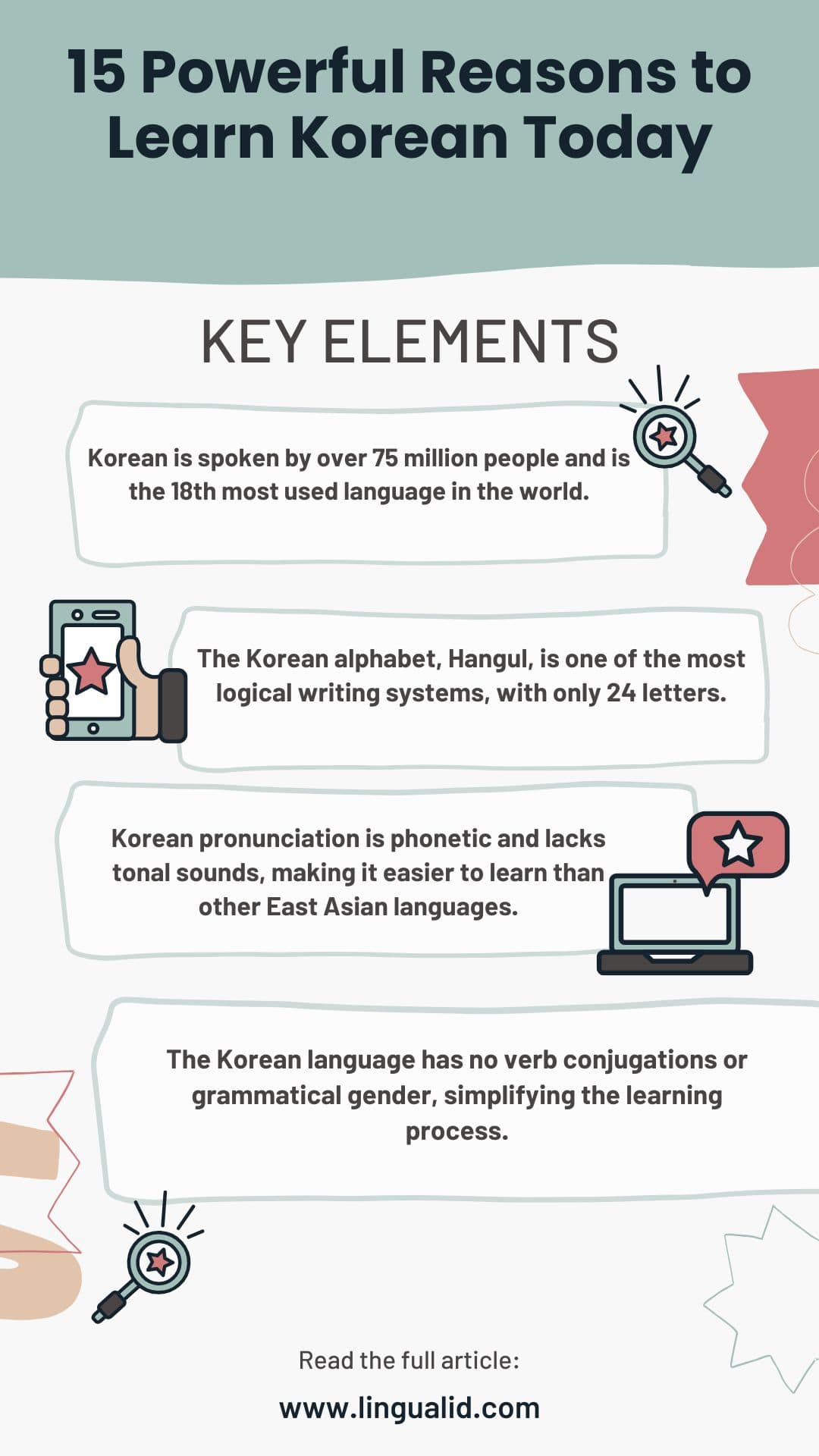Did you know Korean is spoken by over 75 million people? It’s the 18th most used language worldwide. Learning Korean can open doors to new cultures and career paths. Let’s explore the top reasons to learn Korean today.

Key Takeaways
- Korean is spoken by over 75 million people and is the 18th most used language in the world.
- The Korean alphabet, Hangul, is one of the most logical writing systems, with only 24 letters.
- Korean pronunciation is phonetic and lacks tonal sounds, making it easier to learn than other East Asian languages.
- The Korean language has no verb conjugations or grammatical gender, simplifying the learning process.
- Learning Korean can enhance career opportunities in fields like technology, finance, and trade.
- Key Takeaways
- The Global Impact of Hallyu (Korean Wave)
- Korean Entertainment's International Appeal
- Cultural Significance Beyond Entertainment
- Korean Companies in Global Markets
- Teaching Opportunities in South Korea
- International Business Relations
- Traditional Korean Values
- Modern Korean Lifestyle
- Social Customs and Etiquette
- Local Experience Enhancement
- Cultural Immersion Opportunities
- Communication with Locals
- Reasons to Learn Korean: Simplified Learning Process
- Comparison with Other Languages
- What are the reasons to learn Korean?
- How has the Korean Wave influenced the global popularity of Korean culture?
- What makes the Korean alphabet, Hangul, unique and accessible?
- What are the career and business advantages of learning Korean?
- How can learning Korean enhance the appreciation of Korean entertainment?
- What are the cultural aspects of Korean society that learning the language can help understand?
- How can learning Korean benefit brain health and cognitive abilities?
- What are the advantages of learning Korean for travel in South Korea?
- How is the simplicity of Korean grammar beneficial for language learners?
- What are the advantages of Korean language's lack of grammatical gender?
- How can learning Korean enhance the culinary experience?
- What are the social benefits of learning Korean?
The Rising Influence of Korean Culture in Modern Society
The Korean Wave, or Hallyu, has become a global phenomenon. It has captured audiences worldwide. From K-pop’s infectious rhythms to Korean dramas’ captivating storylines, Korean entertainment has made a big impact on modern culture.
Learning Korean and understanding its culture are becoming more important. This is because Korean culture’s influence is growing.
The Global Impact of Hallyu (Korean Wave)
Korean pop music, or K-pop, is a powerful cultural movement of the 21st century. Groups like BTS and Blackpink have become global sensations. They top charts and break records.
The K-pop industry is a major force. Entertainment companies like SM Entertainment find and develop young talents. They sign them on long-term contracts.
Korean Entertainment’s International Appeal
Psy’s “Gangnam Style” was a turning point. It became the first YouTube video to hit 1 billion views. This success opened doors for Korean dramas and films.
These stories have won fans worldwide with their compelling narratives and stunning visuals. Knowing the Korean language lets viewers dive deeper into these cultural experiences. They can appreciate the storytelling’s nuances.
Cultural Significance Beyond Entertainment
Korean culture values respect, honor, and pride deeply. It goes beyond entertainment. Korea’s transformation from a war-torn nation to a tech and manufacturing leader is remarkable.
Understanding the Korean language and its culture offers insights into this dynamic society. It shows the depth and richness of Korean culture.
Korean cuisine is also gaining popularity. It’s known as one of the healthiest and tastiest in the world. This shows the diverse cultural richness the Korean Wave brings to the global stage.
As Korean culture’s influence grows, learning Korean becomes more important. The benefits of speaking Korean are clear.
Simplicity of the Korean Writing System (Hangul)
Learning Korean is easier because of its simple writing system, Hangul. King Sejong created it in 1446. It’s known for being logical and efficient, with just 24 letters.
Hangul is easy to learn because each letter shows how to make a sound. This makes it simple to write and read. It’s a big reason why people want to learn Korean.
Korea’s literacy rates are very high because of Hangul. They have been over 99% for many years. This shows how well Hangul works.
The Korean government celebrates Hangul on October 9th every year. This day honors the script’s creation in 1446. It highlights Hangul’s importance in Korean culture and language.
| Hangul Characteristics | Details |
|---|---|
| Number of Letters | 24 (14 consonants, 10 vowels) |
| Creation Year | 1446 (Joseon Dynasty) |
| Literacy Rate in Korea | Over 99% for decades |
| Hangul Proclamation Day | October 9th |
Hangul’s simplicity and cultural value make it a great reason to learn Korean. It’s not just for learning the language. It opens doors to Korean culture, entertainment, and business.
Korean Language Career Opportunities and Business Advantages
Learning Korean can open doors to many career and business opportunities. South Korea is home to big names like Samsung, Hyundai, and LG. Knowing Korean can give you an edge when working for these companies or doing business with them.
Korean Companies in Global Markets
Korean companies are growing worldwide, and they need people who speak Korean. They look for those who can talk to Korean leaders, make deals, and work well in different places. Knowing Korean can make you stand out in tech, finance, and trade, where Korean companies are big players.
Teaching Opportunities in South Korea
Teaching English in South Korea is a great job for native English speakers. You need a bachelor’s degree and a TEFL certification. Knowing Korean can help you talk better with students and understand their culture.
International Business Relations
Even if you’re not working for a Korean company, knowing Korean is useful. It helps you understand Korean business culture and talk to partners. Showing you know Korean shows you respect their culture, which is important for business.
In short, learning Korean can lead to many career and business chances. It can help you work for Korean companies, make international deals, or teach English in South Korea. Investing in Korean language skills can make you valuable in today’s global market.
Understanding K-Pop and Korean Entertainment Media
The reasons to be fluent in korean and the value of mastering korean are clear in K-pop and Korean media. Boy bands like BTS and Blackpink have become global stars. Korean dramas have also won hearts with their stories.
At the center of this boom is the Korean language. Knowing Korean lets fans enjoy K-pop and dramas more. They can understand the language’s nuances and cultural references.
Shows like “Reply 1988” and “Crash Landing on You” have won fans worldwide. But for those who speak Korean, the experience is even richer. They can catch the cultural jokes and emotional depth that make these stories special. Learning Korean opens a world of entertainment.
“K-pop and Korean dramas are gateways to understanding a diverse and fascinating culture. By learning the language, fans can unlock a deeper level of connection and appreciation for these art forms.”
K-pop’s catchy tunes and Korean cinema’s stories are reasons to learn Korean. As Korean entertainment grows globally, speaking the language offers a deeper experience. It’s rewarding for fans and enthusiasts.
reasons to learn Korean for Cultural Understanding
Learning Korean opens a door to South Korea’s rich culture. It connects us to Confucianism and Buddhism, and shows us the modern Korean lifestyle. The language is key to understanding the country’s identity.
Traditional Korean Values
Korean culture values respect for elders and family. This is seen in the language, with honorifics and special verb endings. Knowing these helps us connect with Koreans and build strong relationships.
Modern Korean Lifestyle
Today, Korea mixes old and new traditions. It celebrates couple holidays and loves matching outfits. Learning Korean lets us see these customs up close and appreciate Korean life more.
Social Customs and Etiquette
Korean social rules are full of traditions and hidden rules. Knowing Korean helps us follow these customs, avoiding mistakes. It’s key for greeting elders and understanding business formality.
“Learning the Korean language opens a window to understanding the country’s unique cultural heritage and modern-day practices. It’s a journey of self-discovery and global awareness.”

Top Reasons to Learn Korean: Learning Benefits for Brain Development
Learning the Korean language boosts your brain’s health and sharpens your thinking. Studies show that learning a new language, like Korean, increases brain matter. This leads to better brain connections and flexibility.
People who learn new languages see their brain’s executive function improve. This means they get better at solving problems and handling many tasks at once. Also, speaking multiple languages helps you understand your surroundings better and process language more finely.
The importance of learning Korean goes beyond just speaking it. It sharpens your thinking and memory by using different brain parts. This is great as you get older, when your brain naturally starts to shrink.
Adding the Korean language to your learning can open your eyes to new perspectives. It makes you more open-minded and aware of different cultures. These skills help you adapt to new places and understand different views, making you more versatile and well-rounded.
Travel and Navigation Advantages in South Korea
Learning Korean can make your trips to South Korea much better. Even a little Korean can help you talk to locals. They often want to chat with tourists, leading to better experiences and deeper cultural understanding.
Local Experience Enhancement
Knowing Korean makes traveling easier. You can use public transport, order food, and read menus. This lets you find hidden spots and enjoy real local life, not just tourist areas.
Cultural Immersion Opportunities
With Korean, you can really connect with people. You’ll learn about Korean traditions and modern life. Talking and joining in cultural events can create lasting memories and friendships.
Communication with Locals
Even a bit of Korean can help a lot. Locals appreciate when you try to speak their language. They’ll help you and share tips, making your trip unforgettable.
| Feature | Benefit |
|---|---|
| Efficient Public Transportation | South Korea has a fast, clean, and reliable public transport system. The KTX “bullet train” can cross the peninsula in just 3.5 hours. |
| Helpful Mobile Apps | Apps like Kakao Maps and Papago translator make traveling and communicating in Korea easier for tourists and expats. |
| Online Shopping Convenience | Gmarket, Korea’s Amazon Prime, offers quick delivery for online shopping. |
| Air Quality Monitoring | The Air Visual app gives real-time pollution updates, helping you plan your day. |
| Vegetarian-Friendly Resources | The Happy Cow app helps find vegan and vegetarian restaurants, showing Korea’s rich plant-based food history. |
Learning Korean opens up many travel benefits in South Korea. You’ll navigate better, understand menus, and connect with locals. Whether you’re visiting for a short time or longer, speaking Korean will enhance your experience.

Korean Language Structure and Grammar Simplicity
One of the big advantages of Korean proficiency is its simple grammar. Unlike many other languages, Korean doesn’t have complex verb changes for person or number. Instead, it uses particles to show how words relate to each other, making it easier to learn.
Korean sentences always follow the same order: subject-object-verb (SOV). This makes it simpler than languages with flexible word orders. Also, making a noun plural is easy; just add 들 (deul) after the noun.
Another reason for choosing Korean education is that it doesn’t have grammatical gender. Korean pronouns change based on how formal you are with the speaker, not the subject’s gender. This makes learning easier, as it avoids the complexity of gender-based pronouns.
| Korean Grammar Elements | Simplicity Factors |
|---|---|
| Sentence Structure | Consistent SOV order |
| Noun Plurals | Add particle 들 (deul) |
| Pronouns | No grammatical gender |
| Particles | Indicate grammatical functions |
| Verbs | No conjugations based on person or number |
Learning these basic Korean grammar rules helps learners quickly understand the language. They can then focus on growing their vocabulary and speaking skills. The Hangul writing system also adds to the advantages of Korean proficiency and the rationale for Korean education.
The Advantage of No Grammatical Gender in Korean
Learning Korean is easier because of its simple grammar. Unlike many European languages, Korean doesn’t have grammatical gender for nouns. This means learners don’t have to remember the gender of each word.
This lack of grammatical gender makes learning Korean simpler. There’s no need for gender agreement between nouns, adjectives, and articles. This simplifies the learning process a lot.
Reasons to Learn Korean: Simplified Learning Process
Korean is easier to learn than languages like French, Spanish, or German. These languages have different noun genders. Korean, on the other hand, doesn’t have gender-based rules.
This lets Korean learners focus on sentence structure and vocabulary. They don’t have to worry about gender agreement. This makes learning Korean more straightforward.
Comparison with Other Languages
Languages with grammatical gender require careful matching of nouns, adjectives, and articles. This can cause confusion and mistakes. Korean’s lack of gender makes it easier to learn.
This simplicity helps with communication too. Speakers don’t have to worry about gender-specific terms. This is helpful in professional settings where clear language is important.

The lack of grammatical gender in Korean is a big advantage. It makes the language easy to learn and use. Korean’s simple grammar and logical writing system make it popular among language learners worldwide.
Korean Food Culture and Culinary Experiences
Learning Korean opens up a world of delicious food and cultural experiences. Korean food is known for being healthy, flavorful, and tied to local traditions. From kimchi to Korean barbecue, knowing Korean is more than just eating.
In Korea, eating is a social activity. People gather around tables to share meals. By knowing Korean, you can order food, learn about ingredients, and share your likes, making meals more enjoyable.
- Over 200 different varieties of kimchi are available in Korean food culture.
- Kimchi is listed as a UNESCO intangible cultural heritage, reflecting its deep cultural significance.
- The favorite Korean chili pepper, Cheongyang, has a Scoville rating of 10,000 units and is known for its high capsaicin content.
Mastering Korean also lets you try local specialties. For example, dwaeji gukbap in Busan or makchang in Daegu. It’s a chance to explore and appreciate Korean culture more deeply.
“Korean cuisine is deeply tied to the regions in the country, with each having dishes unique to their climate.”
Learning Korean is more than just a language. It’s a key to understanding Korean food culture and traditions. The culinary and cultural insights you gain are unmatched.
Building Meaningful Relationships with Korean Speakers
Learning the Korean language opens doors to deeper connections with Korean speakers. It makes conversations more meaningful and helps understand cultural nuances. Koreans often appreciate when foreigners try to learn their language, leading to warm friendships.
Language exchange sites like Conversation Exchange offer chances to practice Korean and make international friends. Korean language skills improve social opportunities and boost confidence in interactions with people from other cultures.
Mastering Korean can open many doors, like studying at top Korean universities or building strong relationships with Koreans. It also lets you dive deep into Korean culture. Knowing Korean opens up various career paths, from working in big companies to starting your own business, both at home and abroad.
- Korean is the native language of about 80 million people.
- Korean is spoken in neighboring Yanbian, China, and by millions of Korean expats and immigrants found in Europe, North America, and other parts of the world.
- In some Western cities like Toronto, London, Los Angeles, and Vancouver, Korean is spoken as commonly as in Seoul.
- Learning Korean is highlighted as a gateway to understanding Korean culture, customs, traditions, and social interactions, fostering meaningful connections with Korean people.
Enrolling at language institutes like KSI Dhaka 2 is presented as an investment in one’s future, opening doors to success in academics, careers in Korean companies, and a deeper understanding of Korean culture.

Mastering the Korean language opens up a world of possibilities. It lets you study at top Korean universities, build strong relationships with Koreans, and dive into Korean culture. Learning Korean is a smart investment in your future, leading to success in academics, careers in Korean companies, and a deeper understanding of Korean culture.
Conclusion
Learning Korean brings many benefits, like cultural appreciation and professional gains. It makes traveling better, helps you understand Korean entertainment, and builds strong relationships with Korean speakers. The language’s simple writing system, Hangul, makes it easy to learn.
Knowing Korean opens up a world of culture, K-pop, and job opportunities. It’s great for personal growth, career advancement, or exploring Korean traditions. The rise of Korean culture worldwide and the job chances it offers show the value of speaking Korean.
Start your Korean learning journey for cultural immersion, social connections, and personal growth. The benefits are endless, making it a great choice to explore Korean language and culture.
FAQ
What are the reasons to learn Korean?
How has the Korean Wave influenced the global popularity of Korean culture?
What makes the Korean alphabet, Hangul, unique and accessible?
What are the career and business advantages of learning Korean?
How can learning Korean enhance the appreciation of Korean entertainment?
What are the cultural aspects of Korean society that learning the language can help understand?
How can learning Korean benefit brain health and cognitive abilities?
What are the advantages of learning Korean for travel in South Korea?
How is the simplicity of Korean grammar beneficial for language learners?
What are the advantages of Korean language’s lack of grammatical gender?
How can learning Korean enhance the culinary experience?
What are the social benefits of learning Korean?
Oualid Cheddadi is the founder of Lingualid, a platform that inspires independent language learners worldwide, regardless of the language they are learning. The name “Lingualid” is derived from the Portuguese word for “language,” “língua,” and the last three letters of Oualid’s name, “Lid.”



